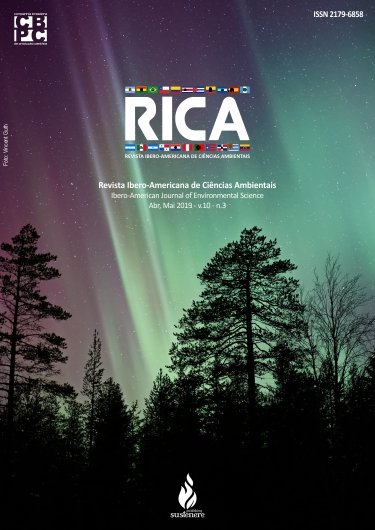Análise do comportamento de um solo na presença do esgoto doméstico em vala de Infiltração
DOI:
https://doi.org/10.6008/CBPC2179-6858.2019.003.0012Keywords:
Nitratos/Nitritos. Permeabilidade.meio ambiente e PEIR.Abstract
The source of contamination from domestic sewage to the ground and consequently to groundwater is a current reality. In Brazil, the primary treatment system of the sewage through septic tank with anaerobic filter and infiltration ditch serves a large part of the Brazilian population, according to Report (ABES, 2015). For this purpose, a Percussion Drill was carried out at 4 determined points and 5 holes in the infiltration trench area at depths of 0.50 meters and 1.00 meters. In situ permeability tests were carried out, evaluating the hydraulic conductivity values, granulometry values, Plasticity Indexes, Liquidity Limits, Plasticity Limits, Biochemical Oxygen Demand, Chemical Oxygen Demand, Nitrate Concentration, Nitrite Concentration, Ammonia, total coliform and thermotolerant and estimation over time of the reach of the contaminating plume of treated domestic sewage in the basement. From the results obtained, it is concluded that the parameters and studies carried out show that the contamination load from the domestic Sewage sample does not reach the water table level and does not generate the contamination propagation. The use of the vegetation itself with its root system contributes to decreasing Nitrate and Nitrite levels at acceptable levels according to Conama Resolution 357 (BRASIL,2005) and the PEIR matrix demonstrates that there is a possibility of high Environmental Impact, but the responses of the demonstrate that the characteristics of the environment mitigate this possible contamination.
Keywords: Nitrates / Nitrites; permeability. environment and PEIR
Downloads
Downloads
Published
Issue
Section
License
The CBPC - Companhia Brasileira de Produção Científica (Brazil CNPJ: 11.221.422/0001-03) the material rights of the published works. The rights relate to the publication of the work anywhere in the world, including rights to renewals, expansions and dissemination of the contribution, as well as other subsidiary rights. All electronically published works may subsequently be published in printed collections under the coordination of this company and / or its partners. The authors preserve the copyright, but are not allowed to publish the contribution in another medium, printed or digital, in Portuguese or in translation.









